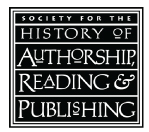Sarah Werner
Election
Position
Name
Sarah Werner
Candidate statement
Sarah Werner (independent book historian and digital strategist, Washington, DC).
I entered the field of book history as a teacher, rather than a researcher. I spent nearly a decade at the Folger Shakespeare Library creating and leading a program for undergraduates studying early print materials. My new book, Studying Early Printed Books 1450–1800: A Practical Guide, approaches the question of how books were made from the point of view of a teacher: what are the key points, why are they important, and how can we demystify working in spaces with rare books?
As the leading organization dedicated to studying book history, SHARP should also lead the way in teaching. In addition to gathering pedagogical resources for all aspects of our field, SHARP should encourage the creation of pedagogical tools. Workshops and discussions in dedicated online spaces could spur the development and publication of open-access teaching resources. SHARP could also work with librarian and archivist organizations to spur connections between our closely aligned fields; creating guidelines for successful collaborations might help teachers, librarians, and archivists overcome colleagues’ anxieties about such work. Surveying SHARP members would surely reveal other opportunities we have for improving our pedagogical portfolio.
I entered the field of book history as a teacher, rather than a researcher. I spent nearly a decade at the Folger Shakespeare Library creating and leading a program for undergraduates studying early print materials. My new book, Studying Early Printed Books 1450–1800: A Practical Guide, approaches the question of how books were made from the point of view of a teacher: what are the key points, why are they important, and how can we demystify working in spaces with rare books?
As the leading organization dedicated to studying book history, SHARP should also lead the way in teaching. In addition to gathering pedagogical resources for all aspects of our field, SHARP should encourage the creation of pedagogical tools. Workshops and discussions in dedicated online spaces could spur the development and publication of open-access teaching resources. SHARP could also work with librarian and archivist organizations to spur connections between our closely aligned fields; creating guidelines for successful collaborations might help teachers, librarians, and archivists overcome colleagues’ anxieties about such work. Surveying SHARP members would surely reveal other opportunities we have for improving our pedagogical portfolio.
